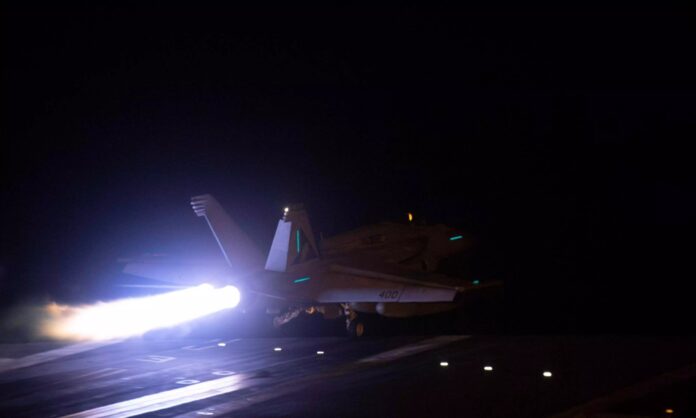The United States, in coordination with its allied nations, launched additional strikes in Yemen in a bold response to an upsurge in Houthi rebel attacks on commercial vessels, targeting a crucial radar site utilized by the rebels.
This strategic move followed a comprehensive assault on nearly 30 Houthi locations just a day prior, showcasing the resolve of the international coalition in thwarting Houthi actions that jeopardize vital international trade lanes in the Red Sea.
Despite the initial strikes, the Houthi rebels persisted in their aggression, firing yet another anti-ship ballistic missile.
In response to this provocation, the United States took a measured approach, launching a retaliatory strike specifically targeting a radar site used by the rebels.
President Joe Biden issued a stern warning, emphasizing the U.S. commitment to responding decisively to Houthi aggression and safeguarding freedom of navigation in crucial waterways.
The recent developments highlight the complex and evolving geopolitical landscape in the region, with tensions escalating as the United States and its allies navigate the delicate balance of maintaining maritime security and responding to provocations from Houthi rebels.
Coordinated International Response
The coordinated efforts by the United States and its allied nations, including the United Kingdom, Australia, Bahrain, Canada, and the Netherlands, underscore the gravity of the situation.
The coalition’s objective is to secure vital waterways and ensure the free flow of international trade.
The comprehensive assault on Houthi locations aimed to disrupt their capabilities and send a strong message against any actions that could threaten the stability of the Red Sea region.
Persistent Houthi Aggression
Despite the initial strikes, Houthi rebels continued their aggressive stance, firing another anti-ship ballistic missile.
This prompted the U.S. to respond with a more targeted strike on a radar site, signalling a commitment to proportionate and strategic actions in the face of continued provocations.
President Biden’s stern warning reinforces the United States’ dedication to protecting its interests and those of its allies in the region.
Complex Geopolitical Landscape
The ongoing conflict in Yemen highlights the intricate geopolitical challenges faced by the U.S. and its allies.
Balancing the need for maritime security with the imperative to respond to Houthi provocations is a delicate task.
The region’s complex dynamics, with multiple actors vying for influence, contribute to the difficulty of finding a lasting solution to the crisis.
As tensions continue to escalate, the international community watches closely, hoping for a resolution that ensures stability in the Red Sea region.
The actions of the U.S. and its allies send a clear message that they are committed to protecting global trade routes and responding decisively to any threats to maritime security.
The situation remains fluid, and diplomatic efforts are likely to play a crucial role in finding a sustainable resolution to the conflict.
This article was created using automation technology and was thoroughly edited and fact-checked by one of our editorial staff members

